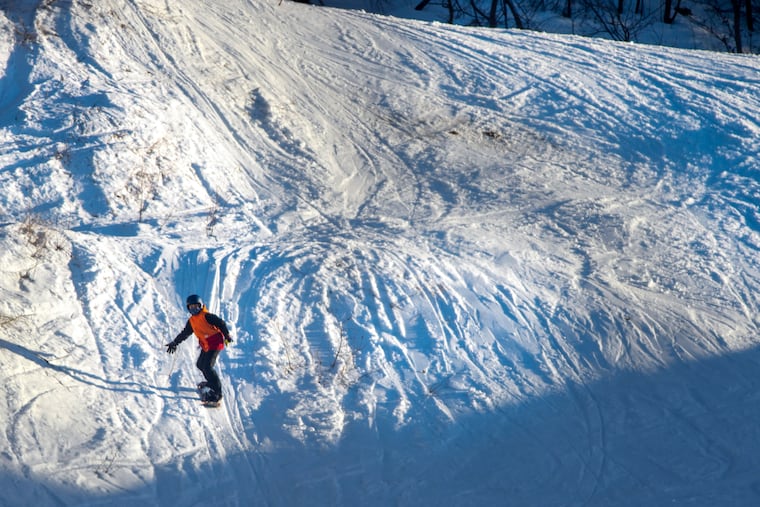This week’s snow could mean a big weekend for Poconos skiing — finally
After a long snow drought, Poconos ski resorts are hopeful that this week's accumulation will bring skiers and snowboarders to the mountains.

Poconos ski resorts have long relied on powerful snowmaking machines to keep trails open despite the weather, but there’s nothing like the lure of natural snow to get the juices flowing for snowboarders and skiers, resort officials say.
“It’s exciting news with all this snow,” said Ashley Seier, marketing director at Blue Mountain in Palmerton, Carbon County, referring to a foot more that fell earlier this week. “Finally, winter shows up.”
It couldn’t have come at a more opportune time: President’s Day Weekend is typically the biggest ski weekend in the Poconos, although Martin Luther King Jr. Day is close. The forecast for the weekend calls for two to four inches more of snow.
Indeed, the snow showed up in a big way this week with 14.5 inches falling in some Carbon and Monroe County locations Tuesday morning, helping build up the bases for resorts. Both counties are in the Poconos region, the closest ski area to Philadelphia. A cold spell has helped in what was turning out to be another less-than-ideal ski season in the East.
Snow drought to snowmaking
Last winter, only 5.1 inches of snow fell in total at Lehigh Valley International Airport in Allentown. Indeed, the winter of 2022-23 was the third least for snowfall for Allentown dating to 1943-1944, according to data from the National Oceanic and Atmospheric Administration (NOAA). The airport, which is in Lehigh County, just outside the Poconos region, offers the most reliable measurements over decades for the area.
So far this winter, 19.5 inches of snow has been recorded at Allentown, where average annual snowfall is about 33 inches. February is typically the snowiest month, with an average of 10.8 inches. March typically brings 6.3 more inches.
“Of course, it hasn’t been the best season so far for snowfall,” Seier said. “But every time we’ve gotten colder temperatures, we took full advantage of our snowmaking system. We are able to produce some pretty great conditions, given what Mother Nature was providing.”
As of Wednesday, Blue Mountain had all 40 trails open. It was the first time this year the resort had been able to open them all. Last year, it was never able to do that.
Blue Mountain has also sold out three Saturdays so far this winter, and could possibly sell out this Saturday and Sunday, Seier said.
Vail Resorts, which owns the Jack Frost Big Boulder ski resorts, said all trails at Jack Frost are open and 85% of trails at Big Boulder are open.
“Thanks to a combination of man-made snow and natural snowfall, our slopes are in fantastic condition,” Vail Resorts said in a statement. “Natural snow always adds to the excitement for our guests and we are looking forward to a great Presidents’ Day weekend.”
Vail Resorts also said the length of seasons at the ski areas has remained consistent because of investments at the facilities and advancements in snowmaking.
“Adapting to weather variability has always been a factor in our business, and we’ve become quite proficient at maximizing every opportunity we get to make snow to ensure that our guests can enjoy excellent skiing conditions throughout the season,” the statement said.
Warming winters
Winters have been bumpy for Eastern skiing and snowboarding as the climate changes.
This winter, so far, has seen above-normal temperatures for Allentown. December ran 4.3 degrees higher than normal, and January ran 2.2 degrees. Though February isn’t over, it, too, has been running well above normal. Consider that, last weekend, Allentown reached 57 degrees, or almost 13 degrees above normal.
Climate Central, a nonprofit group of scientists and communicators who research climate change, reported this week that winter cold streaks have gotten shorter since 1970 in 236 of 240 U.S. locations it analyzed, including Allentown. It also found that winter is the fastest-warming season for most of the U.S., and unusually warm winter days now happen more often.
Vail Resorts noted in its annual report to investors last year that climate change is a concern, saying that unseasonably warm weather can “adversely affect skier visits and our revenue and profits” and noting that snowmaking is expensive.
“The effect of climate change, including any impact of global warming, could have a material adverse effect on our results of operations as a result of decreased snowfall, increased weather variability and/or warmer overall temperatures, which could adversely affect skier visits and our revenue and profits,” the annual report stated. “Revenues and profits generated from mountain summer activities/sightseeing and golf peak season operations are not nearly sufficient to offset offseason losses from our other mountain and lodging operations. This impact could be exacerbated by climate change. “
The report noted that the winter of 2022-2023 was marked by unseasonably warm temperatures that “impacted demand and increased operating costs at our eastern U.S. Resorts” and that skiers’ perceptions of conditions can lead them to “delay or postpone vacations.”
Snow this weekend?
Cameron Wunderlin, a meteorologist with the National Weather Service’s Mount Holly office, said it’s still a bit too early to characterize this winter — and whether there will be more chances to ski or snowboard.
“Meteorological winter is not over,” Wunderlin said, referring to December, January and February. And March often brings surprises, he noted.
The forecast for Jim Thorpe calls for a chance of about an inch of snow overnight Friday. There’s another chance of snow before 1 p.m. Saturday and a high of 34, but amounts are expected to be small.
Sunday looks to be sunny with a high of 36. Monday looks similar with a high of 39.
But the nights will get plenty cold, as low as 18 on Saturday night. Resort crews will have plenty of opportunities to churn out snow.